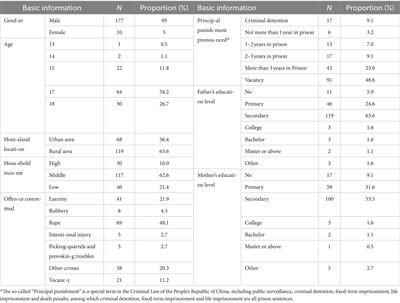Peer assumption: an illusory consensus hidden in the criminal responsibility of juvenile offender—evidence from psychology

Introduction: There is a consensus hidden in the criminal legislation of many countries that the criminal responsibility capacity of juvenile offenders is not significantly different from that of their peers.
The purpose of this paper was to test this hypothesis.
The research objects of this paper were 187 juvenile offenders in J Province, China, who are under detention measures, and 2,449 students from junior high school, senior high school and university in S Province as comparison objects. We subjected the gathered materials to independent-samples t-tests and one-way analysis of variance (ANOVA). Results: (1) The self-control ability (109.30, 123.59) and empathy ability (63.86, 72.45) of juvenile offenders were significantly different from those of ordinary minors, but the difference of dialectical thinking ability was not statistically significant; (2) Except for the influence of mother’s education level and family income on dialectical thinking ability, the other variables had no statistical significance on the three kinds of ability.
Therefore, it was suggested that the correction plan and means for juvenile offenders should focus on the improvement of self-control ability and empathy ability.
Read the full article at the original website
References:
